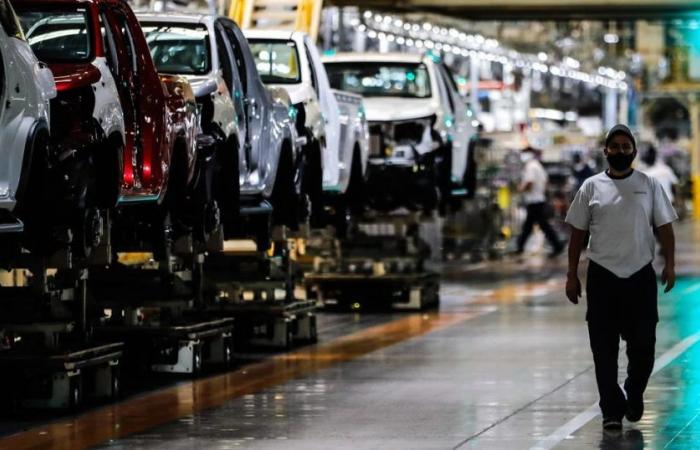The Automotive industry Argentina faces an unprecedented challenge. Six vehicle factories, which represent a significant part of national production, decided to stop their activity for the entire week due to a combination of factors including falling demand, declining exports and parts supply problems. This stoppage affects important terminals such as Toyota, Fiat, Renault, Nissan, General Motors and Mercedes Benz Argentina.
The beginning of the short week, marked by the holidays of June 17 and 20, saw these companies close their doors, having chosen not to operate on either Tuesday or Wednesday, the only working days of the week. This decision was confirmed by the companies through statements to local media, highlighting that interruptions in the supply chain and the decrease in the domestic market were decisive in this measure.
Toyota, the country’s main automotive manufacturer, suspended its production due to logistical problems. The company noted that the lack of imported parts was a crucial factor, exacerbated by problems with the arrival of ships. This stoppage not only affects daily production, but also forces the company to resort to the “credit hours” system to compensate for days not worked. Additionally, Toyota launched a voluntary recall plan in response to the drop in exports towards key markets such as Chile, Colombia, Ecuador and Peru.
For its part, Fiat faces a similar situation. The plant in Córdoba stopped operations due to a lack of essential components from Brazil, specifically the steering box. This problem not only affects local production, but also has repercussions in Brazil, where thousands of units of the same model are incomplete for the same reason. In Córdoba, a large number of Cronos units remain unfinished.
At the Santa Isabel plant, Córdoba, which produces vehicles for Renault and Nissan, the decision was made to stop production, a measure that had been communicated to staff ten days in advance. The main reason is the adaptation of production to the current level of demand. Renault is considering reducing working hours from eight to six per shift starting in July, which would also affect Nissan, which operates in the same establishment and on a single shift.
General Motors in Santa Fe decided to suspend all activity during the week, aligning with the general trend of the sector. The terminal has been adjusting its staff and production to align with current demand. The decision is also attributed to high cost of restarting production after a long weekend and with only two working days in perspective.
Mercedes Benz, specifically its van division in Virrey del Pino, La Matanza district, paused its production as part of a reform process at the paint plant. Although this decision is part of a technical update, it also reflects the difficulties faced by the industry in general.
In contrast, other automakers such as Volkswagen, Ford and the Stellantis plant in El Palomar, where Peugeot and Citroën models are produced, reported that they will continue their operations normally this week.
The crisis is not limited to the automotive sector. The Acindar steelmaker has also begun to slow its production due to a drop in domestic demand. In November last year, the plant employed 1,150 workers, but has reduced its workforce to about 1,000 through non-renewal of contracts and voluntary retirements. This measure will extend until December of this year, with a complete shutdown of the plant scheduled for June 24. The company has assured that the new work scheme foresees a complete recovery of operations by mid-July.
The brakes on the automotive companies and the situation in Acindar are reflections of a broader problem in the Argentine economy: the industrial activity recorded a sharp drop in the annual measurement. According to a recent report from the Argentine Industrial Union (UIA), industrial activity fell 14.2% year-on-year in April, accumulating a decrease of 12.4% in the first four months of the year. Although a monthly rebound was observed, which suggests that the sector could be bottoming out, the situation remains critical.
The UIA highlighted that the good data for April is due in part to a greater number of business days and the normalization of specific problems that affected some sectors in March. However, the entity also warned that the monthly series shows a possible plateau or a slight drop, influenced by difficulties in trade with Brazil due to floods in the south of that country.
The automotive sector is one of the hardest hit, with a year-on-year drop of 27.9%. Other sectors, such as cement shipments (-27.1%) and agricultural machinery patents (-22.9%), have also suffered significant decreases. The demand for electrical energy from Large Industrial Users fell by 11.3%, and trade with Brazil showed a decrease of 42.8% in imports and a 3.9% in exports.
Currency settlement, which had grown during the first three months of the year, fell again by 38%, partly due to the comparison base of the 2023 soybean dollar. The UIA warned that, although activity could be close to a floor, the industrial sector faces difficulties due to low demand and increased costs. The entity stressed the importance of the recovery of the domestic market not being channeled solely through greater imports, but also boosting local production and employment.
The UIA report also highlighted the loss of jobs in the industrial sector, with an acceleration of the fall in registered salaried employment. Since last August, more than 15,000 jobs have been lost in the industry. In addition, 53% of companies reported drops in production, 60% in sales, 37% in exports and 24% in employment, compared to the same month of the previous year.


